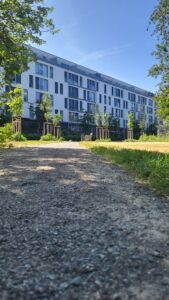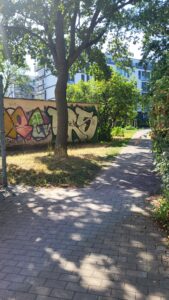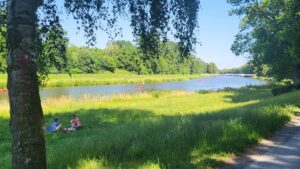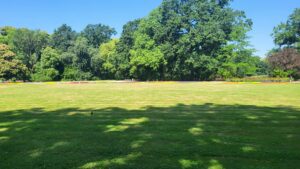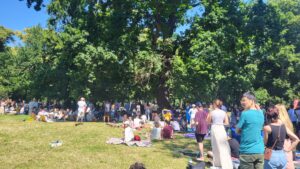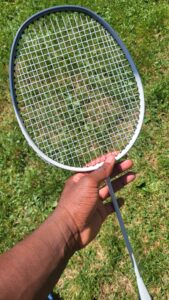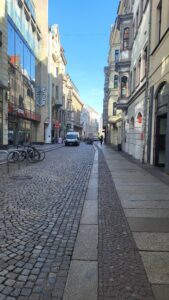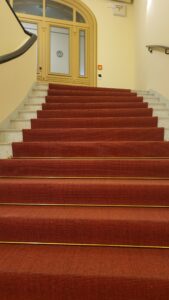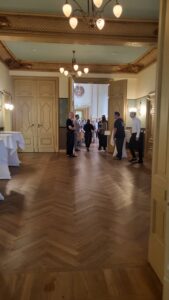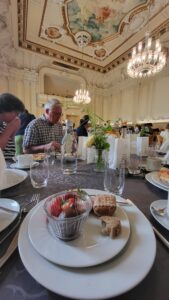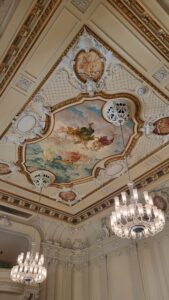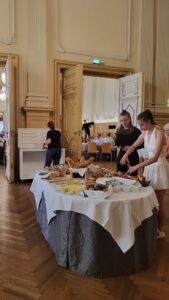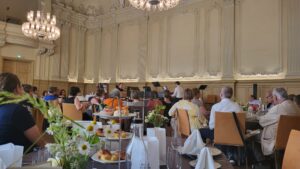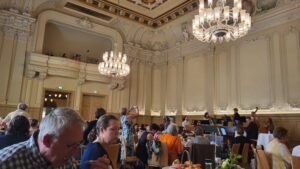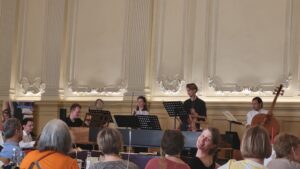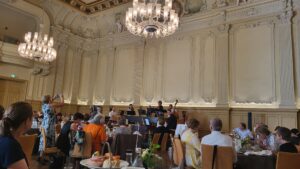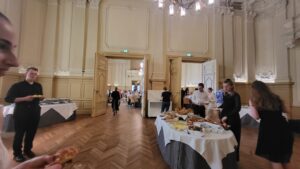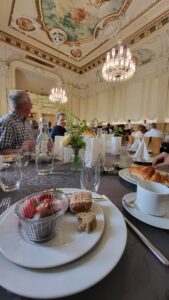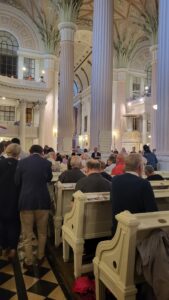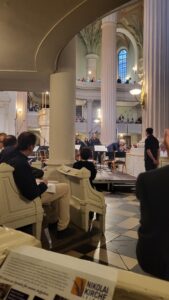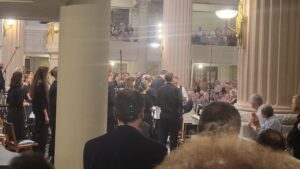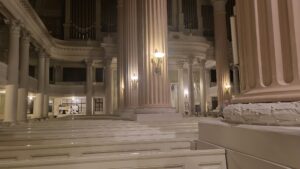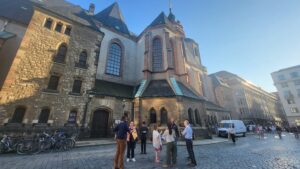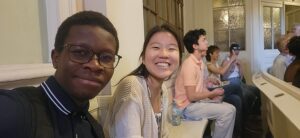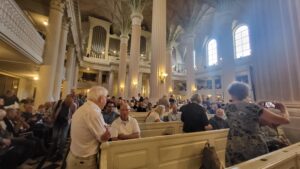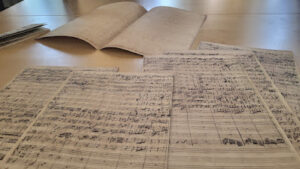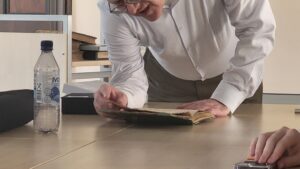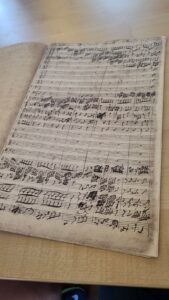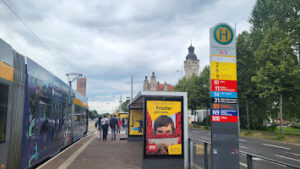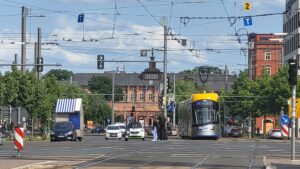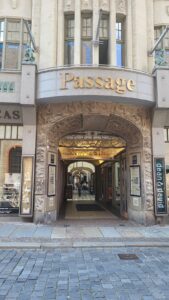Introduction: Princeton in Leipzig

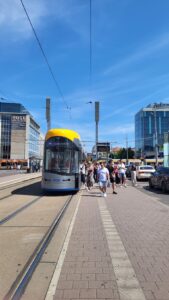
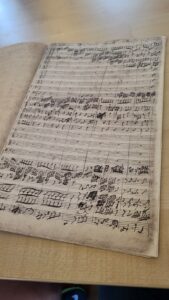
“Seminars by Princeton’s Prof. Wendy Heller explore the music performed at the festival. Dr. Ruth Ochs, conductor of the Princeton Sinfonia, provides coaching on students’ performance of relevant repertoire, culminating in a public recital. Language classes at each student’s level are provided by interDaF, supplemented by weekly one-on-one tutorials with Dr. Jamie Rankin of the German Department. And all of this takes place in Leipzig, considered by many to be one of the most exciting cities in Germany.”
The 81 words in this passage don’t lie. I applied and proceeded to enroll in this course for several reasons; let’s name them:
Firstly, my primary motivation for participating in the Princeton in Leipzig program was to enhance my singing skills through intensive performance coaching while immersing myself in the rich musical traditions of Leipzig. Having only played the recorder at Grade 1-2 music level in high school, this program offered me an unparalleled opportunity to build my confidence as a performer in a historically rich environment.
This is the third time I’ve mentioned this in my life, but the reason I was interested (and still am) in improving my singing skills is that I believe I’ve a talent. In short, while going about any mundane or thrilling activity, I come up with songs. I don’t necessarily have to sing the song or brainstorm deeply on it. Still, it just starts playing in my head with a complete set of main lyrics – the chorus, hook, perhaps another stanza – lyrics for the background singers, and the most intriguing part is that there’s a perfect accompanying beat. It’s always amazed me, especially since I’ve never understood what notes, instruments, or singing ranges (aside from saying ‘low’ and ‘high’) my brain simulates as being performed.
An almost complete song begins, and it ends. In the past, when I was really into music, I’ve noted down the lyrics and sung them out. To this day, I still remember the song about me and my best friend in primary school entitled “You’re The Star and I’m The Linker”, the one about my and an acquaintance on the school bus’ bags called “Royalex”, and the rather self-centered one called “I Am A Legend.” At random times, they can play in my head and take me back to the exact moment or at least how I felt in 2015, 2016, or 2017. It’s how I’ve been able to remember certain people who’ve only been around for a few days in my life, or those that I haven’t encountered in almost a decade. There are several of them; there could be 3-7 albums depending on how one decides to group them.
Thus, I want to use my voice and this talent to reflect on the past, to embrace the present, dream about the future, and, as a Christian, praise the God I believe in. In 2017, my peers regarded me as a good singer. However, the lack of exposure to choir or vocal music in high school meant I lost the ability to articulate my singing voice, except for the one time I sang the entirety of “How Great Thou Art” during the pandemic. In the past two years, I’ve tried to sing, but without much success in harnessing the full potential of my vocal cords. I was interested in taking singing lessons during the past Spring, but my schedule didn’t allow it. Having decided that I would have to wait till the Fall, I saw Princeton in Leipzig as the door that could open a world of possibilities for me in this universe of my life: music and singing.
Now, with that said, I was slightly concerned when one of the program page brochures said there would be “no coaching.” In hindsight, perhaps that was a misread. One of my professors can correct me on this, as I found it difficult to find this detail in the GPS brochure at the time of writing.
Not only did I view myself as being able to appreciate the works and legacy of the famous German composer Johann Sebastian Bach, whose works I’d never listened to, but I also thought it’d allow me to deepen my understanding of how music transcends linguistic and cultural barriers.
Next, I was excited to learn about a new language. However, to me, Deutsch is not just any language. Having spent a significant amount of time learning about Germany’s history over the past 8 years and following current events, such as the 2021 and 2025 federal elections, my interest in learning German was at an all-time high.
During my spring semester, I took a freshman seminar on intercultural communication. It introduced me to the intricacies of pragmalinguistics, politeness, and cross-cultural exchange — how language reflects and shapes social practices. Hence, I also saw actively participating in a public recital in Leipzig while simultaneously studying German as an opportunity to apply what I’d learned.
Last but not least, as much as this was going to make a once-thirteen-year-old’s dreams come true, Leipzig was personally significant to me as the home of RasenBallsport Leipzig, one of my favorite soccer teams; it still is for this reason. The city’s blend of history, culture, and contemporary life makes it a fascinating place to experience the intersections between music, language, and community.
Everything you’ve read thus far is context. Each bit of it will be relevant in the reflection proper that is to come. The course description, the context I’ve provided, and what I will proceed to reflect on are words – accurate and precise words. However, I will never be able to write that fully captures the essence of the new knowledge, discoveries, realizations, and emotions I gained and experienced on this excellent summer study abroad. Nonetheless, that will not stop me from telling you all about it.
Baroque & Heroes
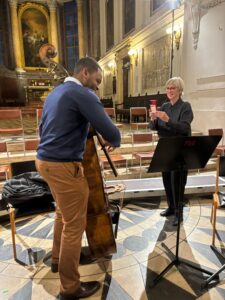
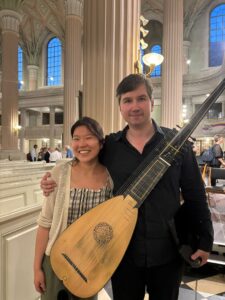
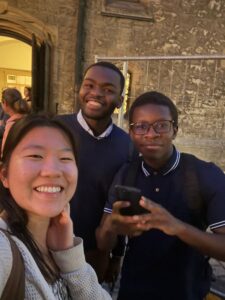
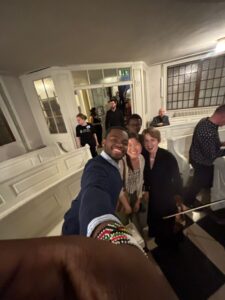
The first time I recall seeing the word ‘Baroque’ was in the guide on how to play the recorder in 7th grade. The last time I remember hearing that word was in presentations my classmates and I did for our music class about the classical music eras: Medieval, Renaissance, Baroque, Classical, Romantic, Modernist, and Postmodernist. I had completely forgotten about these facts until our first reading began, debating whether Bach marked the end of the Baroque era or the beginning of the Classical one.
Now, almost everybody in the class had a favorite Bach piece. Some of them also loved Mozart, Mendelssohn, and others of a similar ilk. Perhaps it was because I didn’t enjoy my 7th-grade music class at the time, but the idea of truly loving Baroque music was novel to me. My mind couldn’t let go of the passionate and elegant gestures that accompanied the energetic and comprehensive voice with which Prof. Heller discussed Bach, the musical history of Leipzig, and attending conferences in Halle during the pre-departure orientation. Hearing my fellow Zimbabwean Tendekai proclaim J.S. Bach as his favorite composer added to the fuel. I really needed to understand the how and why of how one could come to appreciate Baroque and Bach’s music in such a fervent and adoring manner.
After the first concert, I was thrilled to see how Tendekai and Laura were so jubilant to meet their heroes (plus their instruments), the bassist and another individual whose name I’ve forgotten.
I felt the same way when James held the concert bassoon and spoke with the bassoon players at the St. John Passion concert as well. When they explained to me how and why it meant so much to them, from the details of why they regard them highly to the rarity and special nature of the instruments. James reacted to the bassoonists following him on Instagram in the same manner I probably would if the Scuderia Ferrari Formula 1 team followed my account. In addition, Tendekai and Laura’s excitement, which saw them share moments as precious as Tendekai’s performance on that special bass, being recorded by the bassist herself, would be akin to my getting to play on Roger Federer’s court or something. The beauty of it was that they were right there.
Speaking on behalf of all long-term soccer fans (or fanatics), I could describe soccer as pronounced in my first ever soccer video game: “the game that we love, the game that we live for. This isn’t any game. It’s our game.” In that moment, I truly understood that what the role models and heroes mean to me in the sports and games that I watch and play is the same for them in the realm of music. Notwithstanding, they could accentuate that feeling with a different set of words.
However, as I’ll go on to explain in a later section, this Bach character truly transformed into a new role model of my own, in addition to the ones I already had, as the course drew to a close.
Three Blogs on Music Theory: But What About The Singing?

Going into the course, I found it highly unlikely that I would be singing in this course. However, I must tell you, when you meet a truly joyous and wonderful music professor (Dr. Ochs) – who happens to be a conductor – on the 2nd day that tells you, “I’m going to make a musician out of you,” in the most calm, confident and collected way possible in front of all your classmates, you listen and you hold onto hope. So, I listened and held onto hope.
Until Tuesday, 17th, and Thursday, 19th of 2025, I really hadn’t had a clear-cut chance to sharpen my ability to sing the songs for the recital that the class had been working on. Dr. Ochs’ determination to see me make an attempt never died down, however. The trajectory of the question “will I perform? will I not perform?” completely changed that week.
On the latter day, it became apparent that I might just perform in the suit I had brought all the way from Princeton. With the help of Andy and Prof. Rankin, I finally understood how to change pitch (change note) mid-word and how to hold the same note. Andy was a great explainer of many errors and tricks vocalists come across and utilize, such as figuring out how to maximize one’s singing time before running short of breath or doing a continuous increase in pitch.
With his encouragement and questions, I found the answer to a question that had been bothering me for the past four (4): could I still sing the relatively higher pitches for my now deep voice? It turned out that I could, despite running out of breath, as I had been struggling to do so when I tried to sing the songs I had made in my head. Since then, I’ve never forgotten to breathe down and not bring my shoulders up – thank you, Ruth!
Leading up to this, I always daydreamed of a moment I would get to sing in front of an almost endless array of grass bordered by trees on a slightly higher altitude that stood behind. I’d always thought I’d have to do it at night by the golf field separating Forbes and the Graduate College. Fortunately, to my surprise, the experience occurred much earlier and in a place I would’ve never expected.
After the Koffee Cantata Fruhstuck concert in the Salle Pologme, I decided to visit the periphery of the Red Bull Arena – home of Rasenballsport Leipzig. My encounter exceeded the expectations you might have for a situation where I’m unable to enter the stadium. Seeing it up close just brought immense joy to me. As I circled around the entire structure, I discovered a new sport that resembles volleyball, but with a significantly larger ball called fistball. A competitive game was being played by what appeared to be local youth teams. As I completed my circular path around the stadium, I began singing. I was just happy to even if it didn’t sound great. In the middle of my song, that’s when I saw it – the almost-endless grass with the trees on the edge of a neighboring incline. I embraced it and sang even more in the backyard of the Red Bull Arena.
Unfortunately, my phone battery was dead by the time I arrived at the stadium. However, this moment was special – it was a dream come true, and I appreciated how singing thousands of miles away from home can bring some of the best joys you’ll ever experience at a fantastic place you’d never thought possible, just a couple of years before.
The road to the recital was rather tricky. On the day of our penultimate rehearsal, random, unfortunate errors sprang up. I got lost. Deciphering how to get to the Reformed Evangelical Church – a brand-new course location – turned out not to be my best work, as I disembarked the tram two stations before the correct one. Therefore, this meant I was now on a 2-3 day (zwei bis drei Tagen) streak of getting lost (verloren).
In the end, I managed to make the last 5 minutes of this particular rehearsal. I was disappointed, as I really felt like I had let the team down. However, on the bright side, I still managed to get in a few lines of practice—which always lifts the soul—and the post-rehearsal chat I had with Ruth was deep, encouraging, and delightfully helpful. I may have had nerves going into the recital, but after that awful day, I knew I just wanted to enjoy it, even if I ran short of breath at an inopportune time.
The Beauty of Passionate Performance
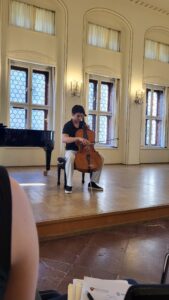
Speaking of enjoying music joyfully, I must mention two of my classmates’ performances at the recital.
During the dress rehearsal, Maurice informed Dr. Ochs that he couldn’t play one of the cello suites. Dr. Ochs announced to the crowd, twice, that one of the performances was unfortunately not going to take place.
However, when Maurice’s initially planned time for his solo was upon us, he showed up. It turned out he was going to perform after all. I could see the confidence, tenacity, and commitment on his face, his eyes, and his hands as he sat down with his cello. In that moment, I knew that something extraordinary was about to happen, and I instinctively reached for my recorder.
When that suite was performed, Maurice utterly demonstrated all the subtle and superb things which you could do with a cello. It was beautiful. It was like watching a racing driver start from last place and go on to steal the whole show with an epic win in a commanding performance that was head and shoulders above the rest, due to skill rather than chance. The applause that we, the audience, gave fed off the intricate way he played the cello.
I have always found the applause culture of orchestras, operas, and ensembles so fascinating in how it emanates respect and appreciation, especially in light of the bowing. This moment was so special; I recalled telling my roommate, Felix (a violin player), about the applause culture. After showing him the video I took of Maurice’s performance, we will have a discussion on whether it is one of the top 5 applause culture moments we’ve ever seen.
Another instrumental performance I really enjoyed was the duet between Charlotte and Noah. During our last lunch with everyone at InterDaF, Charlotte reflected on how she was happy to have practiced such an epic piece in a way she hadn’t recently on campus. I’ve just been left stunned by how this course provided her with a chance not only to practice again with ample space and time to really push herself, but also at such a mesmerizing level.
Bach – Another Role Model of My Own

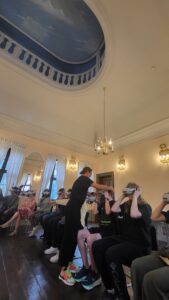
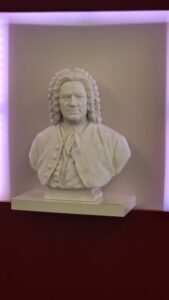
Speaking of practice, Bach’s VR self had a few words to share with us about the topic in the Bach Archives.
I certainly have my critique about the graphics during the VR experience – Bach’s coat literally cut through the piano bench he sat on. However, I’ll never forget when he advised us that “any modest talent can be turned into the finest ability.”
After spending weeks in a seminar, understanding his life beyond the legend emanating from the style of his statue, comprehending who Bach, the church musician, court musician, father, husband, and son, was, was enlightening. With that quote, I felt encouraged about my singing and any other pursuits that pique my curiosity, which I want to explore. Compared to the weeks leading up to June, I felt like I knew Bach better. My classmates can definitely say otherwise, as they’ve probably already delved into his life and performed his music. Today, he is genuinely remarkable.
The Bach Community
Lastly, who else thinks the Bach is superb? The Bach Community thinks Bach is cool!
Being able to meet and engage with the performers on stage or in the backrooms after the Kaffeekantate, St. John Passion, and Concerto No. 20 was an opportunity I never expected. Like the director of the festival said, this isn’t Hollywood, where there’s a significant distance between the performers and the audience.
In this world, John Eliot Gardiner is a highly regarded figure. He made the time to talk as extensively as possible to Tendekai and Laura, who hold him in a regard that I can’t put into words. Dr. Tatlow took the time to share with us their outstanding research on whether universal harmony influenced Bach’s compositional style. At the same time, Professor Dr. Peter Wollny made extra time for us to explore Bach’s composition and choir endowment accounts with him.
In short, I love how tight-knit and open the Bach community is. I wasn’t learning or interacting with their work from a distance. Still, the natural setup of the concerts allows one a clear-cut chance to interact with the performers, scholars, and coordinators in a way I wouldn’t have imagined. They’re family, and if you’re reading this, having never been to a BachFest or Leipzig, I know you can be part of it too.
Conclusion
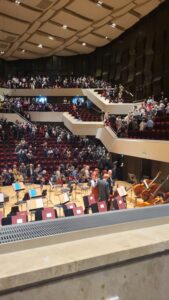
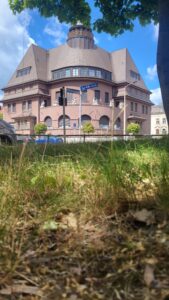
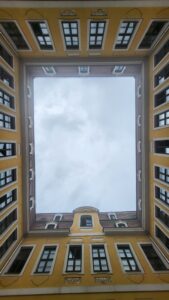
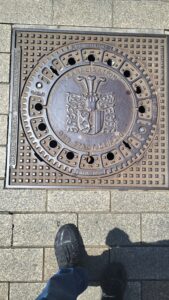
From the first time I shed a tear while watching a musical performance at the Gewandhaus to embracing the scenery and atmosphere around me, including the chandeliers and the wonderful people I met while learning German, I grew as a singer.
From the times I struggled to pronounce the different “ch” consonants in German class and at 1:1 with Prof. Rankin to the moment I finally got it with 30 minutes of extra help from the Phonetiks teacher and Vito’s encouragement every day, I grew as a German speaker.
From the time I had the point-of-sale experience at Aldi, where the lady complained that I couldn’t speak German in Germany, to having a conversation in Germany with a random man in an NFL shirt on the tram, and the two women who work at the Breite Straße bakery, I grew as an intercultural communicator.
To conclude, my experience surpassed what I hoped I would gain from in only its extent but also its ways. Thank you so much to Wendy, Jamie, and Ruth for all their support! Danke Katherina und InterDaF! Thank you to the Music Department, German Department, Office of International Programs, and Princeton! And of course, thank you to all my classmates! It wouldn’t have been what is was without you all.

